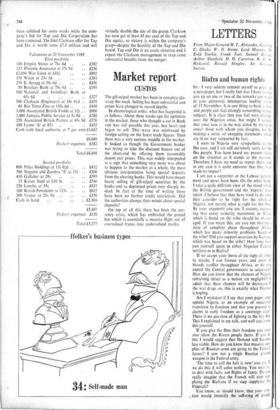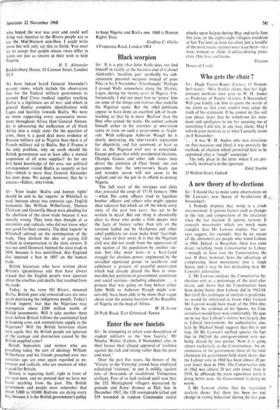Biafra and human rights
LETTERS
From Major-General H. T. Alexander, Godlres. C. Okeke, W. H. Irvine. Lord Monson. Dr Enid Starkie,_ Frank Teer, Samuel Bri' tan, Arthur Shenfield, D. H. Cameron, R. G 1V. Rickcord, Ronald Hingley, Sir Gr.::am Sutton.
Sir: I very seldom commit myself to paper in a newspaper, but I really feel that I have to take you up on one or two of the remarks you make in your extremely intemperate leading article of 15 November. It is one thing to back a view and people can feel strongly concerning serious subjects. It is clear that you feel very strongly over the Nigerian crisis, but might I suggest that your case is in no way aided by trying to smear those with whom you disagree, nor by making a series of sweeping statements which are in no way supported by fact.
I went to Nigeria very sympathetic to the Ibo case, and I am still extremely sorry for the Ibo people. You have heard my present views on the situation as it stands at the moment. Therefore I have no need to repeat them, and in any case it is quite apparent that they have made no impact!
I am not a supporter of the Labour govern- ment and never have been. On the other hand, I take a quite different view of the stand which the British government and the 'experts' have taken. I believe that they have tried to do what they consider to be right for the whole of Nigeria. not merely what is right for the lbos. By your argument you are, I assume, suggest- ing that every minority movement in Africa which is based on the tribe should be encou aged. If you mean this. are you not inviting state of complete chaos throughout Africa. which has many minority problems based the tribe? Did you support secession by Katan which was based on the tribe? How long ha you yourself spent in either Nigerian Federal territory or in Biafra?
If we accept your thesis of the right of tribes to secede, I can foresee years and years of bloody conflict throughout Africa, or do you expect the Central governments to acquiesce? How do you know that the chances of Nigeria remaining intact as a nation are negligible? admit that these chances will be decreased if the war drags on, this is exactly what Ojukwu is hoping.
Am I mistaken if I say that your paper once upheld Nigeria as an example of successful transition to freedom and that you pressed its claims to early freedom as a sovereign state? There is no question of fighting to the last Ibo. This I explained in my talk, and well you know this yourself.
If you give the Ibos their freedom you must also allow the Rivers people theirs. If you do this I would suggest that Iboland will become less viable. How do you know that massive sup- plies of Russian arms are going to the Federal forces? I saw not a single Russian ground weapon in the Federal army. `The time to call the halt is now' you cry. If we do this it will solve nothing. You must try to deal with facts, not flights of fancy. Do you really imagine that the French will stop sup- plying. the Biafrans if we stop supplying the Federals? You know, or should know, that your solu- tion would intensify the suffering of people
who hoped the war was over and could well bring vast injustice to the Rivers people not to say the Mid-Western non-Ibos. I could write more but will only say this to finish. You must try to accept that people whose views differ to yours are just as sincere in their wish to help Nigeria.
H. T. Alexander Bucklersbury House, 83 Cannon Street, London EC4
We have indeed heard General Alexander's present views, which include the observation that for the Federal military government to prevent Red Cross medical supplies reaching Biafra is a legitimate act of war, and which in general display complete identification with Lagos and hostility towards Biafra. We were no more supporting every secessionist move- ment throughout Africa than General Alexan- der is advocating the unification of all black Africa into a single state. On the question of arms, there is a good' deal more evidence of Russian military aid to Nigeria than there is of French military aid to Biafra. But if France is the only problem, why on earth should the British government not at least offer a mutual suspension of all arms supplies? As for our first hand knowledge of the area, our political correspondent visited Biafra as recently as last July—which is more than General Alexander has ever done. We accept, however, that he is sincere.—Editor, SPECTATOR.



































 Previous page
Previous page